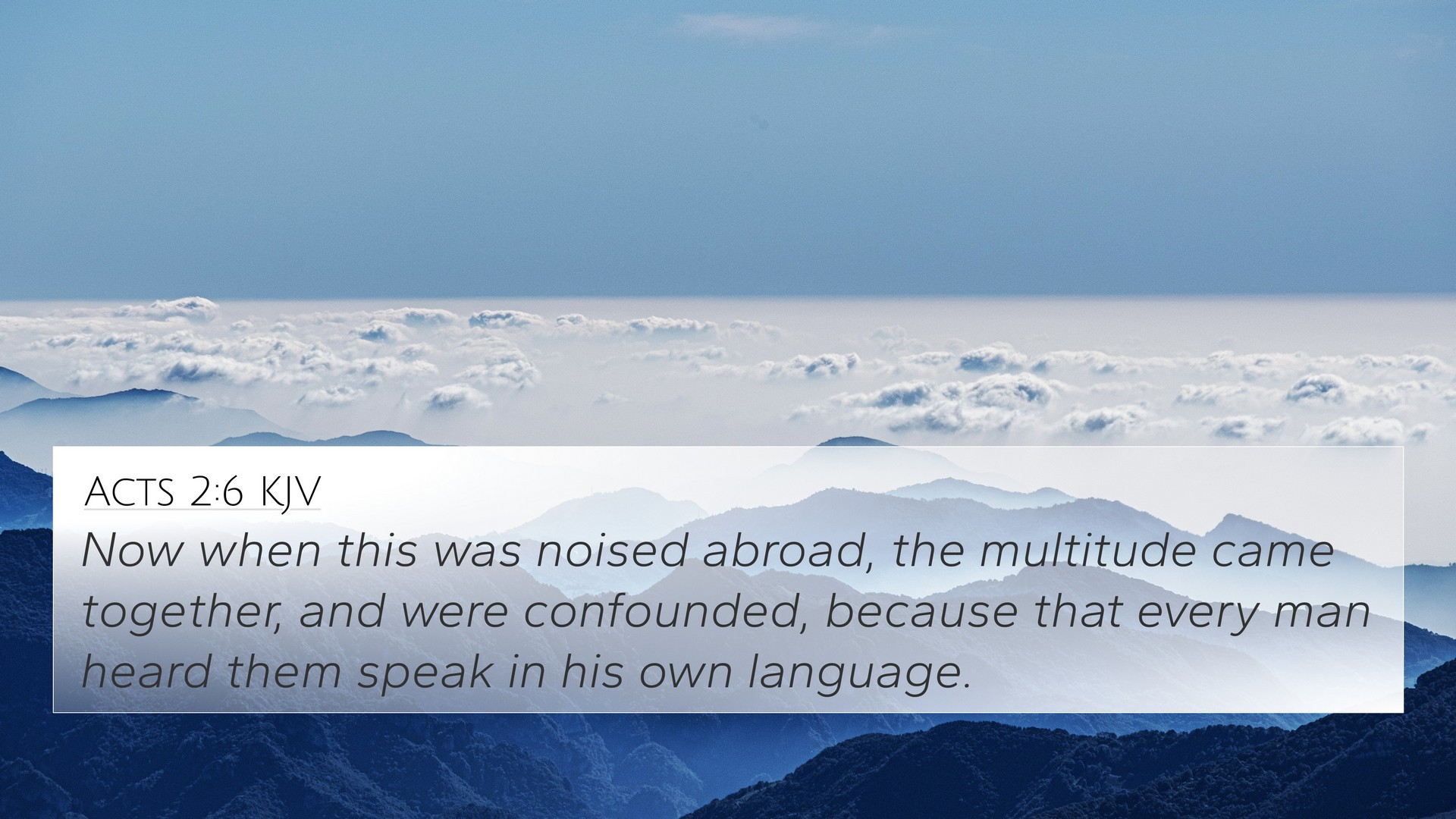Understanding Acts 2:6
Acts 2:6 (KJV): "Now when this was noised abroad, the multitude came together, and were confounded, because that every man heard them speak in his own language."
Verse Summary
The verse describes the event of Pentecost when the apostles spoke in tongues, allowing each listener to hear the Gospel in their native language. This miraculous occurrence drew a large crowd, creating a sense of amazement and confusion among the people.
Commentary Insights
Matthew Henry
Henry emphasizes the miraculous nature of the event, noting that it showcased the power of the Holy Spirit in unifying diverse people through a common message. He points out that this action served as a precursor to the spread of Christianity across different cultures and languages, highlighting God's intention to reach all humankind.
Albert Barnes
Barnes explains that the multitude’s amazement stemmed from hearing the apostles, uneducated men, speaking in their languages. He interprets this as a demonstration of the divine authority of the apostles and the fulfillment of Old Testament prophecies regarding the outpouring of the Spirit.
Adam Clarke
Clarke provides an analysis of the linguistic miracle's implications, noting how it reflects God's desire for inclusivity in His message. He also discusses the sociolinguistic context, highlighting that the hearing of the Gospel in each person's tongue signifies God’s acknowledgment of cultural diversity.
Biblical Cross-References
Acts 2:6 is thematically linked to several other scripture passages that echo the themes of unity, diversity, and the work of the Holy Spirit:
- Genesis 11:1-9: The Tower of Babel - highlights the division of languages as a result of humanity's pride.
- Joel 2:28-32: Prophecy of the Spirit being poured out on all flesh, which is fulfilled in Acts 2.
- 1 Corinthians 12:13: Discusses the unity of the Spirit despite diversity in the body of Christ.
- Revelation 7:9: A vision of a multitude from every nation and language praising God, showing the ultimate goal of God's redemptive plan.
- John 20:21-22: Jesus breathes on the apostles, emphasizing the impartation of the Holy Spirit.
- Matthew 28:19-20: The Great Commission, where Jesus commands the apostles to reach all nations, resonating with the multilingual outpouring of the Spirit.
- Romans 10:12-13: Affirms that there is no distinction among people in receiving God's grace, echoing the message of Acts 2.
Thematic Connections between Bible Verses
When examining the connections between Acts 2:6 and other Bible verses, it becomes evident that the themes of inclusion, the Holy Spirit's work, and the missionary nature of the Gospel are prevalent throughout Scripture. This encourages a cross-referencing approach for deeper understanding:
- Inclusive Mission: Acts 10:34-35 - God shows no favoritism, and accepts from every nation those who fear Him and do what is right.
- Spread of the Gospel: Mark 16:15 - The call to preach the Gospel to all creation echoes the multilingual aspect of Pentecost.
- Unity in Diversity: Galatians 3:28 - This verse emphasizes that in Christ there is no division, mirroring the unity produced by the Spirit's gift of languages.
Conclusion
Acts 2:6 profoundly illustrates the impact of the Holy Spirit in breaking down barriers, allowing the message of Christ to reach every individual. Through insights from respected commentators and thematic connections across scripture, believers are encouraged to embrace the inclusivity of the Gospel. Indeed, this verse serves as a springboard for exploring inter-Biblical dialogues and deeper scriptural cross-referencing, enriching one's understanding of God's universal call to salvation.







